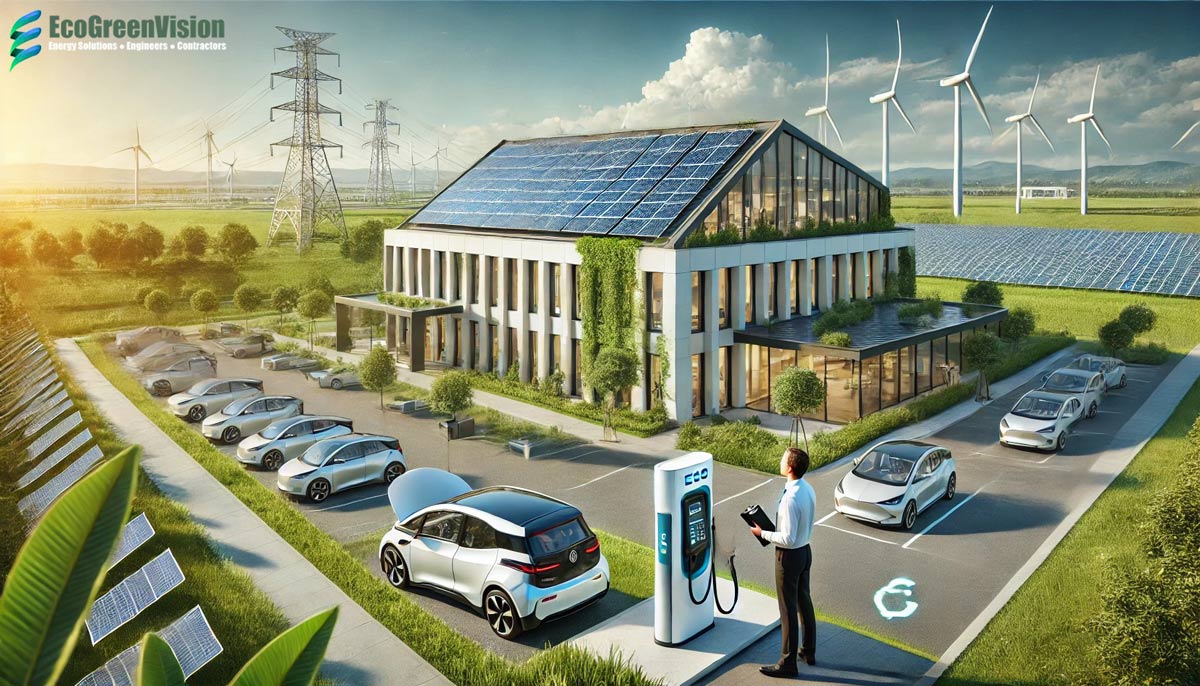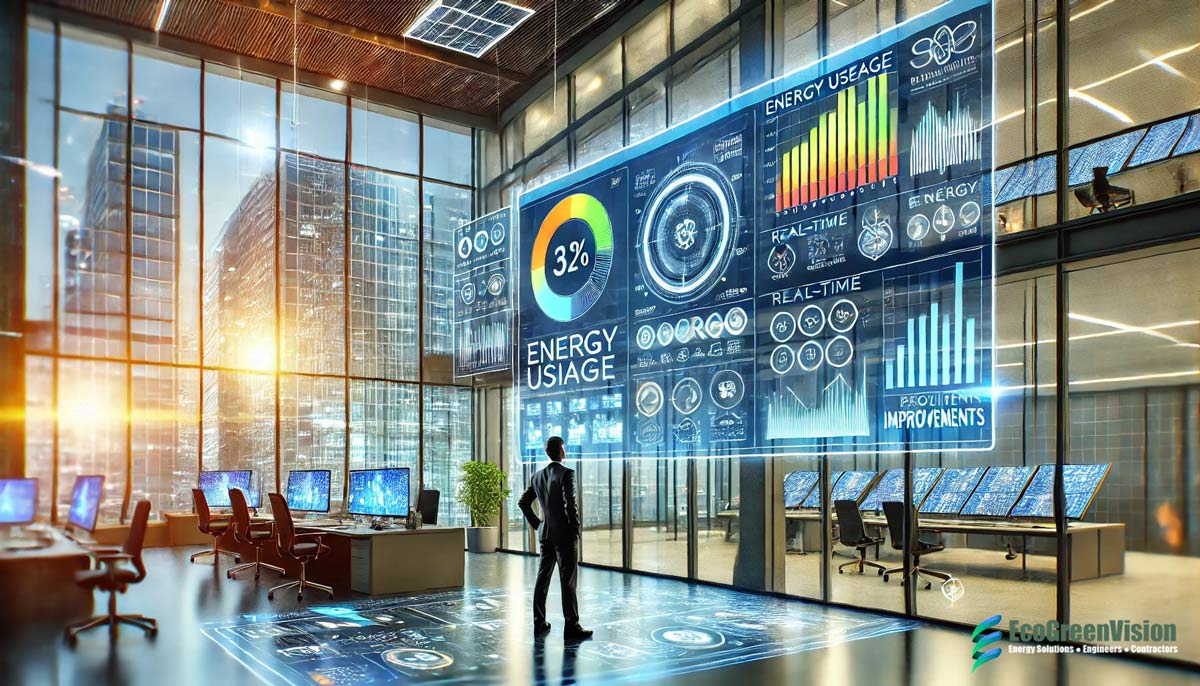In today’s fast-paced and competitive business environment, controlling operational costs has never been more critical. Did you know that businesses can save up to 30% on their energy expenses by conducting a commercial energy audit? These audits go beyond just identifying inefficiencies—they are a powerful tool to optimize energy consumption, reduce utility bills, and contribute to a more sustainable future.
Commercial energy audits help businesses uncover hidden opportunities for cost savings while supporting environmental responsibility. By identifying inefficiencies in systems like lighting, heating, cooling, and equipment, these audits enable businesses to implement smart, energy-saving measures. Not only does this boost profitability, but it also enhances your company’s reputation by showcasing your commitment to eco-friendly practices.
Imagine making a few strategic changes—like upgrading to energy-efficient lighting or fine-tuning your HVAC systems—and seeing noticeable improvements in your energy bills and workplace comfort. These seemingly small adjustments can lead to significant long-term savings and a greener, more productive work environment.
Why Every Business Should Invest in Energy Audits
- Cost Savings: Discover areas where energy and money are being wasted, allowing you to lower utility bills.
- Increased Efficiency: Boost productivity by optimizing energy usage across your facility.
- Environmental Impact: Reduce your carbon footprint and align your business with sustainable practices.
- Enhanced Reputation: Appeal to eco-conscious customers who prioritize working with environmentally responsible companies.
- Access to Incentives: Take advantage of rebates and incentives offered by local utilities for businesses that implement energy-saving upgrades.
At EcoGreenVision, we specialize in helping California businesses achieve their energy efficiency goals through comprehensive commercial energy audits. Our team of experts provides tailored recommendations to optimize your energy consumption and maximize savings.
If you're ready to reduce costs and make your business more sustainable, contact us today at (714) 905 9590 to schedule your energy audit and start your journey toward a greener future!
What Is an Energy Audit?
Think of an energy audit as a comprehensive health check-up for your business's energy consumption. It’s an essential step toward identifying inefficiencies, saving costs, and making your operations more sustainable. During a commercial energy audit, energy experts meticulously evaluate your facility’s energy usage, from lighting and HVAC systems to equipment and insulation.
The goal? To uncover hidden energy waste and provide actionable recommendations that reduce costs, improve efficiency, and lower your carbon footprint. By addressing these inefficiencies, businesses not only save money on utility bills but also contribute to a more eco-friendly future—an increasingly important factor for customers and stakeholders alike.
How Does an Energy Audit Work?
The process typically involves:
- Assessment of Energy Consumption: Experts review how energy is used across your facility, analyzing patterns and identifying waste.
- Evaluation of Systems: Everything from lighting to heating, cooling, and insulation is inspected for inefficiencies.
- Recommendations for Improvement: Auditors suggest practical, tailored solutions to optimize energy usage.
- Implementation Support: Many auditors provide assistance in executing recommended upgrades, such as installing energy-efficient lighting or optimizing HVAC systems.
Why Businesses Need Energy Audits
- Save Money: By addressing inefficiencies, businesses can significantly lower their energy bills.
- Boost Productivity: A more energy-efficient workplace often leads to improved comfort and productivity for employees.
- Environmental Benefits: Reducing energy waste contributes to lower greenhouse gas emissions, enhancing your company’s sustainability.
- Stay Competitive: Energy-efficient practices often lead to long-term cost savings, giving your business a competitive edge.
Imagine cutting your energy costs while creating a more comfortable environment for your employees and reducing your environmental impact—energy audits make this a reality.
Types of Energy Audits: Choosing the Right One for Your Business
Not all businesses are the same, and neither are energy audits. Understanding the different types of energy audits available can help you choose the one best suited to your business’s size, goals, and energy-saving potential. Whether you’re a small business seeking quick insights or a large organization aiming for a deep dive into energy consumption patterns, there’s an audit for you.
Let’s explore the five main types of commercial energy audits and how they can transform your energy management strategy:
1. Walk-Through Audit
This is the most basic type of energy audit and serves as a quick, informal assessment of your energy use. A walk-through audit focuses on visual inspections and straightforward evaluations to pinpoint obvious areas of waste, such as outdated lighting systems or inefficient HVAC units.
- Ideal for: Small businesses or those seeking a starting point for energy efficiency.
- Benefits: Quick insights with minimal disruption to operations.
2. General Audit
Building on the walk-through audit, the general audit goes a step further by collecting more detailed data about your energy usage. It includes a closer look at utility bills and basic calculations to identify trends and inefficiencies.
- Ideal for: Medium-sized businesses ready to explore cost-saving opportunities.
- Benefits: Broader understanding of energy consumption patterns with actionable recommendations.
3. Detailed Audit
A detailed audit dives deep into your business’s energy consumption, combining comprehensive data analysis with expert insights. This type of audit often involves advanced tools and techniques, such as thermographic imaging and load analysis, to uncover hidden inefficiencies.
- Ideal for: Businesses committed to implementing significant energy-saving measures.
- Benefits: Comprehensive recommendations with measurable results for cost reduction and sustainability.
4. Targeted Audit
If your business wants to focus on specific systems or areas, a targeted audit is the perfect choice. This audit zeroes in on particular energy-using equipment or processes, such as lighting, HVAC, or manufacturing systems, to optimize performance.
- Ideal for: Companies with known inefficiencies or specific goals.
- Benefits: Tailored solutions to address specific problem areas.
5. Investment-Grade Audit
The investment-grade audit (IGA) is the most in-depth and thorough type, designed for businesses planning substantial energy efficiency projects. It involves detailed energy cost analysis, feasibility studies, and financial modeling to ensure a solid return on investment (ROI).
- Ideal for: Large enterprises or organizations ready to invest in major energy-saving upgrades.
- Benefits: High-level insights to support long-term financial and energy planning.
How to Choose the Right Energy Audit
When selecting the right energy audit for your business, consider the following:
- Business Size: Smaller businesses may benefit from walk-through or general audits, while larger organizations might need detailed or investment-grade audits.
- Goals: Define your objectives—are you looking for quick fixes, long-term savings, or targeted improvements?
- Budget: While more comprehensive audits require higher upfront costs, they often yield greater savings over time.
By choosing the audit that aligns with your needs, you can maximize the benefits and take meaningful steps toward energy efficiency.
At EcoGreenVision, we offer a range of energy audits tailored to businesses across California. Whether you’re looking for quick insights or detailed strategies, our team will guide you through the process and ensure you achieve your energy-saving goals.
Call us today at (714) 905 9590 to learn more about our commercial energy audit services and start optimizing your energy use!
The Role of Energy Audits in Environmental Responsibility
As businesses face increasing pressure to adopt sustainable practices, energy audits have emerged as a critical tool for promoting environmental responsibility. Beyond the immediate financial benefits, energy audits empower companies to reduce their environmental impact, contributing to a greener and healthier planet.
Incorporating energy efficiency measures based on audit findings not only minimizes energy waste but also aligns businesses with global efforts to combat climate change. Let’s delve into the pivotal role energy audits play in fostering environmental responsibility.
1. Reducing Carbon Footprints

Energy audits provide actionable insights into areas where energy is wasted, enabling businesses to reduce their carbon emissions. By upgrading to energy-efficient systems, companies can significantly decrease their reliance on fossil fuels, contributing to cleaner air and a more sustainable environment.
- Fact: According to the EPA, improving energy efficiency in commercial buildings can reduce greenhouse gas emissions by up to 30%.
2. Encouraging Sustainable Practices
Implementing the recommendations from an energy audit often inspires a ripple effect, encouraging other businesses, customers, and even employees to adopt sustainable practices. Companies that lead by example in energy efficiency can set a new standard in their industries.
- Example: A California-based retailer reduced energy waste through optimized lighting and inspired neighboring businesses to follow suit.
3. Meeting Environmental Regulations
With stricter environmental regulations and sustainability goals becoming the norm, energy audits help businesses stay compliant. Proactively addressing inefficiencies ensures that companies not only meet but exceed regulatory standards, avoiding potential fines and boosting their eco-friendly reputation.
- Insight: California’s stringent energy efficiency policies make audits a vital step for compliance.
4. Boosting Brand Image
Today’s consumers increasingly prefer brands that demonstrate environmental responsibility. By conducting energy audits and sharing the results—such as reductions in energy use and emissions—businesses can enhance their reputation and appeal to eco-conscious customers.
- Stat: A Nielsen study found that 66% of global consumers are willing to pay more for sustainable goods and services.
5. Contributing to Community Impact
Energy-efficient businesses don’t just help themselves—they positively impact their communities. Reduced energy consumption eases the demand on local grids, resulting in more stable energy supplies and lower energy costs for everyone. Businesses that champion energy efficiency often inspire local initiatives and partnerships to promote sustainability.
- Tip: Collaborate with local organizations to amplify your environmental efforts.
Why Environmental Responsibility Matters
In today’s world, environmental responsibility is no longer optional—it’s a necessity. Businesses that prioritize energy efficiency not only contribute to a healthier planet but also gain a competitive edge in their industries. Energy audits provide a clear roadmap to reduce waste, enhance sustainability, and set the stage for long-term success.
The Energy Audit Process: A Step-by-Step Guide
Understanding the energy audit process is crucial for businesses looking to maximize their energy efficiency and reduce operational costs. Conducting an energy audit involves a systematic evaluation of your facility’s energy usage, identifying inefficiencies, and recommending tailored solutions to optimize performance.
This step-by-step guide will walk you through how a commercial energy audit works and highlight the benefits it brings to your business and the environment.
1. Initial Walk-Through Inspection
The energy audit begins with a comprehensive walk-through of your facility. During this phase, the auditor evaluates your lighting systems, HVAC equipment, insulation, and other energy-consuming components.
- Objective: Identify obvious inefficiencies, such as outdated systems or improperly maintained equipment.
- Tip: Provide the auditor with access to all areas of your facility to ensure a thorough inspection.
2. Utility Bill Analysis
Next, the auditor reviews your utility bills to analyze your energy consumption patterns. This step helps pinpoint trends, identify peak usage times, and uncover hidden areas of energy waste.
- Benefit: Gain a clear understanding of how and when your business uses energy, enabling smarter energy management.
3. Data Collection and Equipment Testing
During this phase, auditors collect detailed data about your energy systems and may perform on-site tests to assess efficiency. Tools like thermal imaging cameras and energy meters might be used to detect energy leaks or inefficiencies.
- Insight: This in-depth analysis provides precise information about your energy performance.
4. Recommendations for Energy-Saving Measures
After gathering data, the auditor compiles a detailed report outlining actionable recommendations tailored to your business. These may include:
- Upgrading to LED lighting.
- Optimizing HVAC systems for peak performance.
- Installing energy-efficient equipment or appliances.
- Improving insulation to minimize heat loss or gain.
- Implementing energy management systems to monitor and control usage.
5. Implementation Support
Many energy auditors provide support in implementing the recommended changes. This may involve connecting you with trusted contractors, helping you apply for rebates or incentives, or offering guidance on prioritizing upgrades based on cost-effectiveness.
- Tip: Prioritize low-cost, high-impact improvements like switching to energy-efficient lighting to see immediate savings.
6. Ongoing Monitoring and Evaluation
Once the recommended measures are in place, the final step is setting up a system to monitor energy usage and evaluate the effectiveness of the improvements. This ensures your business continues to operate at peak efficiency over the long term.
- Benefit: Continuous monitoring helps maintain savings and identify new opportunities for efficiency as your business grows.
How to Effectively Implement Energy Efficiency Measures
Implementing energy efficiency measures after an energy audit is key to unlocking cost savings and environmental benefits. With the right approach, businesses can seamlessly transition from recommendations to tangible results, improving both their bottom line and sustainability efforts.
Here’s a step-by-step guide to effectively putting energy efficiency measures into action:
1. Prioritize Recommendations Based on Impact
Start by reviewing the recommendations from your energy audit. Identify the measures with the greatest potential for cost savings and environmental impact. Typically, these include:
- Switching to LED lighting for instant energy reductions.
- Upgrading outdated HVAC systems to improve energy performance.
- Insulating walls and windows to prevent energy loss.
Tip: Begin with low-cost, high-impact upgrades to see immediate results and build momentum for larger projects.
2. Involve Your Team in the Process
Employee buy-in is critical for the success of energy efficiency initiatives. Educate your team on the benefits of these changes and encourage them to adopt energy-conscious habits, such as turning off lights when not in use or optimizing thermostat settings.
- Example: Create an energy-saving awareness program to motivate staff and reinforce the importance of sustainability.
3. Leverage Financial Incentives
Many local utilities and government programs offer rebates, grants, or tax credits for businesses implementing energy-efficient measures. Take advantage of these incentives to offset the initial costs of upgrades.
- Insight: In California, programs like the Self-Generation Incentive Program (SGIP) provide financial support for energy-efficient technologies.
4. Implement Smart Energy Management Systems
Installing smart technologies can help monitor and control energy usage in real time. Tools like automated lighting systems, programmable thermostats, and energy monitoring software ensure consistent efficiency.
- Fact: Businesses using smart energy management systems can reduce energy costs by up to 30%.
5. Establish a Monitoring System

Set up a system to track energy usage and evaluate the effectiveness of your improvements. This allows you to measure progress, identify new opportunities for savings, and ensure long-term efficiency.
- Tip: Regularly review energy usage data to maintain accountability and optimize performance.
6. Celebrate and Share Your Success
Highlight the positive outcomes of your energy efficiency efforts. Share your achievements with employees, customers, and stakeholders to build a culture of sustainability and enhance your brand reputation.
- Example: Use social media or company newsletters to showcase how much energy and money your business has saved.
Frequently Asked Questions About Commercial Energy Audits
1. Why Should I Consider Getting a Commercial Energy Audit?
Energy audits help reduce utility bills, improve efficiency, and lower your carbon footprint. They also attract eco-conscious customers and may qualify you for financial incentives.
2. How Long Does a Commercial Energy Audit Take?
Smaller audits can take a few hours, while detailed audits may take 1–3 days. Larger or more complex facilities may require more time.
3. What Kind of Improvements Can I Expect?
Upgrades may include LED lighting, HVAC optimization, improved insulation, and energy management systems, all leading to significant savings.
4. Are There Financial Incentives for Energy Efficiency Upgrades?
Yes, California offers rebates and tax credits for businesses adopting energy-efficient technologies. Check local utility programs for more details.
5. How Much Does a Commercial Energy Audit Cost?
Costs vary based on the audit type. Walk-through audits are affordable, while detailed or investment-grade audits offer higher ROI despite higher costs.
6. How Often Should a Business Conduct an Energy Audit?
Conduct an audit every 3–5 years or after major changes, such as facility expansions or equipment upgrades.
Prioritize Your Business's Energy Audit in California
Investing in a commercial energy audit is one of the smartest decisions your business can make. Not only do these audits uncover hidden inefficiencies and reduce operational costs, but they also align your business with sustainability goals, improving your reputation and appeal to eco-conscious customers.
With the right insights from a professional energy audit, you can:
- Lower energy bills by addressing wasteful practices.
- Improve workplace comfort and productivity through efficient systems.
- Access financial incentives for energy-efficient upgrades.
- Reduce your environmental footprint, contributing to a greener future.
For more insights on energy efficiency and sustainability, check out this guide from the U.S. Department of Energy: Guide to Energy Efficiency Programs for Businesses.
At EcoGreenVision, we specialize in comprehensive energy audits tailored to the unique needs of businesses across California. From small shops to large enterprises, our expert team provides actionable solutions to help you save money, reduce energy waste, and enhance your sustainability efforts.
Ready to take the next step? Contact us today at (714) 905 9590 to schedule your energy audit and discover how much your business can save while contributing to a cleaner, more sustainable planet.

